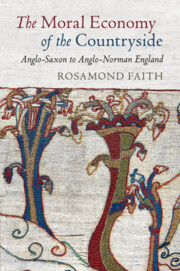Book contents
- Reviews
- The Moral Economy of the Countryside
- The Moral Economy of the Countryside
- Copyright page
- Contents
- Preface
- Abbreviations
- 1 Introduction: The Moral Economy
- Part I Rank
- 2 Lordship
- 3 Our Island Story
- 4 Honour and Respect in Peasant Society
- Part II Reciprocity
- Part III Reputation and Witness
- Part IV The Wolf Sniffs the Wind
- Part V The Aftermath of Conquest
- Part VI In the World of the Manor
- Appendix The Family Farm in Peasant Studies
- Bibliography
- Index
3 - Our Island Story
from Part I - Rank
Published online by Cambridge University Press: 25 October 2019
- Reviews
- The Moral Economy of the Countryside
- The Moral Economy of the Countryside
- Copyright page
- Contents
- Preface
- Abbreviations
- 1 Introduction: The Moral Economy
- Part I Rank
- 2 Lordship
- 3 Our Island Story
- 4 Honour and Respect in Peasant Society
- Part II Reciprocity
- Part III Reputation and Witness
- Part IV The Wolf Sniffs the Wind
- Part V The Aftermath of Conquest
- Part VI In the World of the Manor
- Appendix The Family Farm in Peasant Studies
- Bibliography
- Index
Summary
Chapter 3 argues that a particularly powerful ‘legitimising notion’ was that people’s rights, status, and even their ownership of property, derive from the remote past, even if this was often an imagined past. Anglo-Saxon conquest narratives played a very important part in forming an ‘imagined community’, a people’s sense of their common identity, invoked particularly when the country was under threat. The narrative of Gildas’ ‘Downfall of Britain’ recurs throughout the book as legitimising the association of freedom, land, and public obligation.
Keywords
- Type
- Chapter
- Information
- The Moral Economy of the CountrysideAnglo-Saxon to Anglo-Norman England, pp. 28 - 36Publisher: Cambridge University PressPrint publication year: 2019

